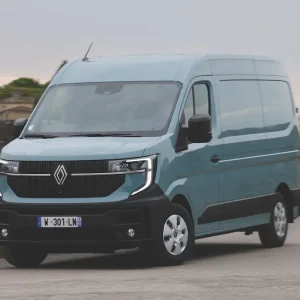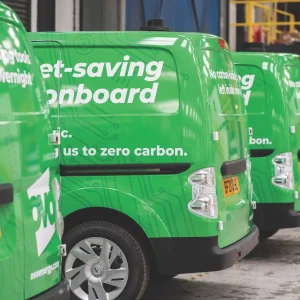The What Van? Light Commercial Vehicle of the Year Award for 2019 goes to a trio of vans built on the same platform that are set to have a profound impact on the UK market.
Although PSA Peugeot-Citroen and Opel/Vauxhall announced more than three years ago that they were to team up for the production of their next light van ranges, PSA’s subsequent acquisition of the Opel and Vauxhall brands, which were formerly owned by General Motors, in 2017, has added more significance to the move.
By combining their resources they have become a major force to be reckoned with in the industry, and the new Citroen Berlingo, Peugeot Partner and Vauxhall Combo are the first products to emerge from what is now Europe’s second-largest automotive group.
Thanks to our partnership with the International Van of the Year (IVOTY) we have been at the front of the queue in getting the chance to run the rule over the new models and can attest that PSA has raised the bar in terms of driveability and load-carrying practicality.
Two wheelbase lengths are available – short (L1) and long (L2) – in all three vans with a 350mm increase between the two sizes, while the total length for the L1 van is 4.4m and 4.7m for the L2. The 350mm wheelbase difference comes from a 190mm increase in the wheelbase length and a 160mm increase in the rear overhang.
Payloads go up to a class-leading 1,050kg while load volume extends to 4.4m3.
Power for all three vans comes initially from a choice of two diesel engines. Due to emissions regulations, a 1.6-litre Euro6.1 engine will be on sale in some markets, including the UK, for the first nine months of production – however, a more powerful (and far more impressive) but smaller-capacity 1.5-litre BlueHDi Euro 6.2-compliant engine will also be available at launch with a 130hp output.
The good news is that this newer engine will supersede the 1.6 and still be available with the same 75hp and 100hp outputs.
Urban operators in particular will also find it worthwhile considering the 1.2-litre Puretech petrol engine with 110hp and 130hp outputs, which will join the line-up in 2019. The higher-powered petrol engine will get the slick new EAT8 auto transmission. This gearbox is also available on the 130hp diesel model and incorporates a stop function with the adaptive cruise control that allows the vehicle to slow to a standstill and then resume the cruise when in traffic. A five-speed manual transmission is fitted as standard on both 1.6-litre models, while the 1.5-litre unit gets a six-speed manual.
As a compact van, it is likely to spend a high proportion of its time in the city where a quiet, capable engine pays dividends. The Euro6.2 1.5-litre unit certainly delivers on this. There’s plenty of sound-deadening to mute its four-cylinder patter, but even from the outside it sings a discreet song. Vibrations through the cabin and steering wheel are minimal too.
It’s a classy engine that matches the rest of the improvements.
During its limited period of service the slightly larger 1.6-litre Euro6.1 unit will prove to be a credible powertrain for the van, but the six-speed manual mated to the 1.5-litre engine is better, with the extra ratio particularly welcome on higher outputs and for motorway cruising.
The auto transmission however, is the true gem of the range. It’s fast and smooth and will be a boon to drivers spending their time in stop-start city traffic. Having sampled the whole range we would conclude it is models with this transmission that best typify the progress and strides in sophistication that the trio of PSA light vans have made.
A pair of new-to-segment technological enhancements also worth flagging up are the onboard weighing system and the surround rear-vision camera. The first alerts you to the fact that you are at 80% of your total weight capacity, and then again when you are overloaded. The second system gives you a rear, side and reversing camera view of what is around you on a five-inch colour screen positioned in place of the rear-view mirror.
The overload indicator is standard on the more rugged workhorse models from the French brands – Grip and Worker in Peugeot and Citroen speak respectively – and can be specified as part of the Construction Pack on the Vauxhall Combo.


The three vans also benefit from the latest driver assistance features such as traffic sign recognition, driver attention alert, cornering lights, keyless entry, trailer stability control and distance alert, which warns of a possible forward collision.
The interiors are smart, well put together and above all else spacious, with different environments for each of the brands.
Two- and three-seat options are available, with the centre seat in a three-seater also doubling up as a fold-down table for use as a mobile office.
There’s also a new design of the Extenso collapsible seat that allows 0.5m extra length to be carried thanks to a load-through bulkhead.
The standout interior is perhaps the Partner’s i-Cockpit. A reworking of Peugeot’s passenger car-designed interior, the i-Cockpit means the instrument cluster is mounted higher with different dials and gauges.
The steering wheel is also flattened top and bottom, giving the cabin a more modern feel.
Overall, the interiors of the new Berlingo, Partner and Combo, which previously shared a platform with Fiat Professional’s Doblo Cargo, are more comfortable and technologically advanced than their predecessors, while the engine and transmission combinations represent a step up in quality.
Light Van of the Year
Having captured the Light Commercial Vehicle of the Year prize, it follows that the Berlingo, Partner and Combo also topped their Light Van of the Year category.
Prices for Vauxhall’s new Combo, excluding VAT, will start at £15,630 for the entry-level Edition trim, rise to £17,705 for Sportive trim, and step up to £18,905 for LE Nav trim (a Crew van variant will be available for £18,605).
Entry-level Citroen Berlingo X models will cost £15,825 and £17,800, Worker trim derivatives are priced from £17,075 to £18,700, Enterprise models go from £17,425 to £20,350, and the new flagship Driver trim starts from £19,970 and rises to £22,970.
Like the Berlingo, the Peugeot Partner will start at £15,825 and climb to £17,800 for Standard and Long versions respectively in entry-level S trim, Professional trim goes from £17,425 to £19,400, prices for Grip increase from £17,075 to £18,700, and flagship Asphalt prices range from £19,970 to £21,820.
Highly Commended: Ford Transit Connect
With the blue oval badge on its nose it’s no surprise Ford’s Transit Connect tops the light van sales chart. The facelifted model is a sector heavyweight, with a new 1.5-litre diesel Ecoblue engine available offering an eight-speed automatic transmission and the 1.0-litre petrol Ecoboost getting a six-speed manual gearbox.
The Connect sports a revised front end with a new three-bar Transit grille, improved aerodynamic performance and a reworked cabin with a new instrument panel, improved connectivity and driver assistance features, and better storage provision. If it’s sheer driveability you’re after then the Connect remains the leader of the pack.
Available in short- or long-wheelbase modes the usual Base, Trend and Limited trim levels
are now complemented by the flagship Sport version.






